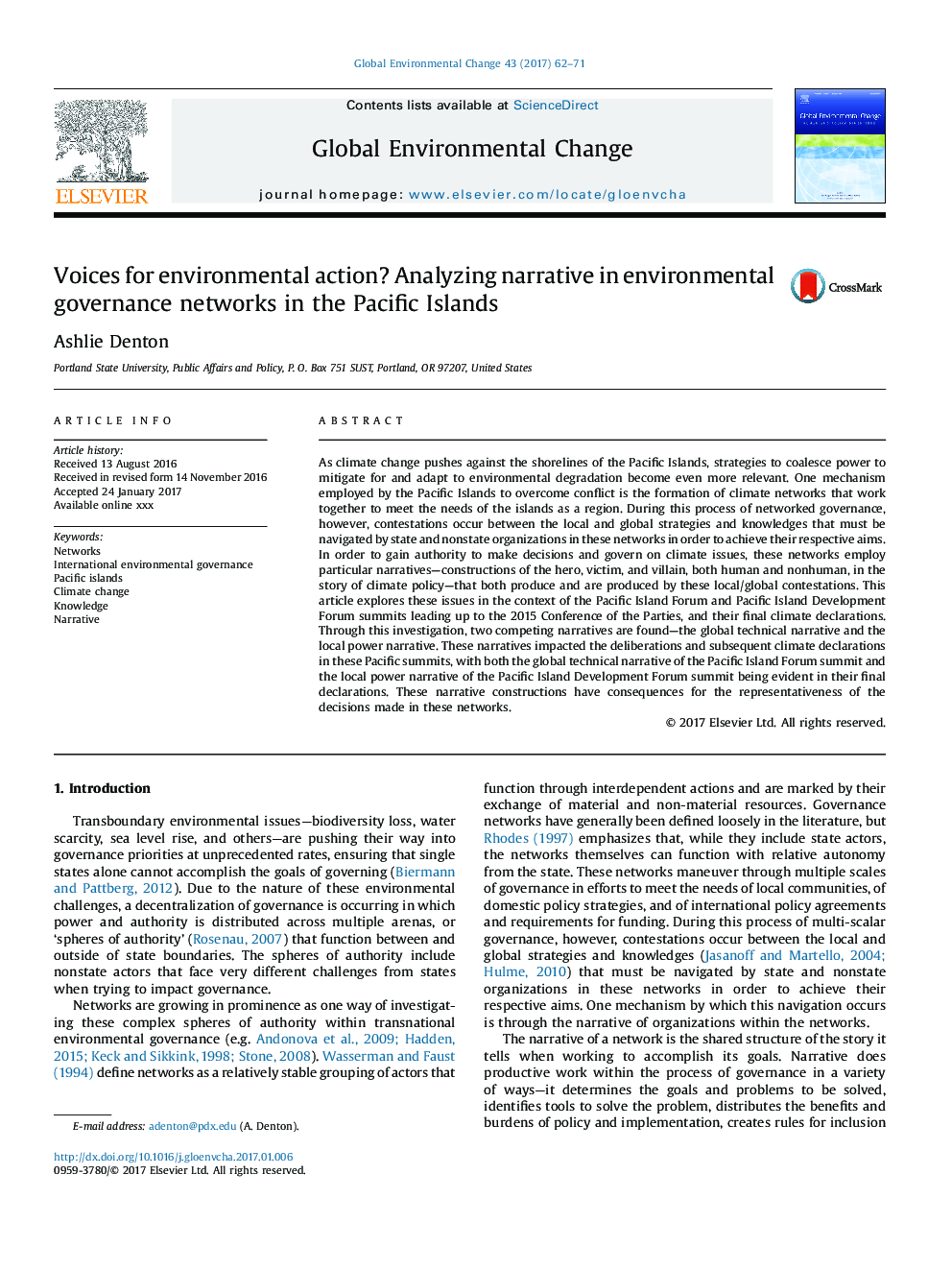| کد مقاله | کد نشریه | سال انتشار | مقاله انگلیسی | نسخه تمام متن |
|---|---|---|---|---|
| 5115957 | 1485115 | 2017 | 10 صفحه PDF | دانلود رایگان |
عنوان انگلیسی مقاله ISI
Voices for environmental action? Analyzing narrative in environmental governance networks in the Pacific Islands
ترجمه فارسی عنوان
صدای اعمال زیست محیطی تجزیه و تحلیل روایی در شبکه های حکومتی محیط زیست در جزایر اقیانوس آرام
دانلود مقاله + سفارش ترجمه
دانلود مقاله ISI انگلیسی
رایگان برای ایرانیان
کلمات کلیدی
شبکه های، حکومت بین المللی محیط زیست، جزایر اقیانوس آرام، تغییر آب و هوا، دانش، روایت،
ترجمه چکیده
به عنوان تغییرات آب و هوایی در مقابل ساحل جزایر اقیانوس آرام، استراتژی های تلفیقی قدرت برای کاهش و انطباق با تخریب محیط زیست بیشتر قابل توجه است. یک مکانیزم که توسط جزایر اقیانوس آرام برای غلبه بر مناقشات مورد استفاده قرار می گیرد، تشکیل شبکه های آب و هوایی است که با یکدیگر همکاری می کنند تا نیازهای این جزایر را به عنوان یک منطقه در نظر بگیرند. با این وجود در طول این فرایند حکومتداری شبکه، اختلافات بین استراتژی ها و دانش های محلی و جهانی رخ می دهد که باید توسط سازمان های دولتی و غیردولتی در این شبکه ها به منظور دستیابی به اهداف مربوطه آنها هدایت شود. این شبکه ها به منظور دستیابی به تصمیم گیری و مدیریت در مورد مسائل مربوط به آب و هوا، روایت ها، ساختارهای قهرمان، قربانی و تبه کار، هر دو انسان و غیر انسانی را در داستان سیاست آب و هوا، که هم تولید و هم تولید می شود مخالفت های محلی / جهانی. این مقاله این مسائل را در چارچوب مجمع جزیره اقیانوس آرام و جلسات انجمن توسعه اقیانوس آرام تا کنون کنفرانس طرفین سال 2015 و اعلامیه های آب و هوایی نهایی خود بررسی می کند. از طریق این تحقیق، دو روایت رقابتی پیدا می شود - روایت فنی جهانی و روایت قدرت محلی. این روایتها به بحث و گفتگوهای آب و هوایی بعدی در این نشست های صلحآمیز در اقیانوس آرام منجر شد، هرچند روایت فنی جهانی از نشست مجمع اقیانوس آرام مجمع و روایت قدرت محلی نشست مجمع توسعه اقیانوس آرام در اعلامیه های نهایی خود مشهود است. این سازه های روایی عواقبی برای نمایندگی تصمیمات ساخته شده در این شبکه ها دارند.
موضوعات مرتبط
علوم زیستی و بیوفناوری
علوم محیط زیست
علوم زیست محیطی (عمومی)
چکیده انگلیسی
As climate change pushes against the shorelines of the Pacific Islands, strategies to coalesce power to mitigate for and adapt to environmental degradation become even more relevant. One mechanism employed by the Pacific Islands to overcome conflict is the formation of climate networks that work together to meet the needs of the islands as a region. During this process of networked governance, however, contestations occur between the local and global strategies and knowledges that must be navigated by state and nonstate organizations in these networks in order to achieve their respective aims. In order to gain authority to make decisions and govern on climate issues, these networks employ particular narratives-constructions of the hero, victim, and villain, both human and nonhuman, in the story of climate policy-that both produce and are produced by these local/global contestations. This article explores these issues in the context of the Pacific Island Forum and Pacific Island Development Forum summits leading up to the 2015 Conference of the Parties, and their final climate declarations. Through this investigation, two competing narratives are found-the global technical narrative and the local power narrative. These narratives impacted the deliberations and subsequent climate declarations in these Pacific summits, with both the global technical narrative of the Pacific Island Forum summit and the local power narrative of the Pacific Island Development Forum summit being evident in their final declarations. These narrative constructions have consequences for the representativeness of the decisions made in these networks.
ناشر
Database: Elsevier - ScienceDirect (ساینس دایرکت)
Journal: Global Environmental Change - Volume 43, March 2017, Pages 62-71
Journal: Global Environmental Change - Volume 43, March 2017, Pages 62-71
نویسندگان
Ashlie Denton,
